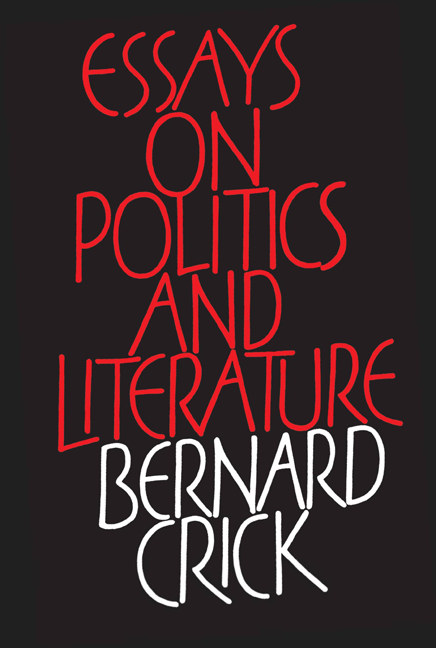Book contents
- Frontmatter
- Contents
- Preface
- Acknowledgements
- Foreword by David Daiches
- One Literature and Politics
- Two The Political in Britain’s Two National Theatres
- Three Young Writers of the Thirties
- Four Koestler’s Koestler
- Five Hannah Arendt: Hedgehog or Fox?
- Six Beatrice Webb as English Diarist
- Seven Words
- Eight My Lse
- Nine Reading The Observer as a Complex Text
- Ten On the Difficulties of Writing Biography and of Orwell’s in Particular
- Eleven Reading Nineteen Eighty-Four As Satire
- Twelve Animal Farm For Schools
- Thirteen Orwell and English Socialism
- Fourteen On the Orwell Trail
- Fifteen Wedekind’s Spring Awakening
- Sixteen Horvath’s Tales From the Vienna Woods
- Seventeen Pinter’s No Man's Land
- Eighteen Polly By Gaslight
- Nineteen Edgar Catches Jenkins’ Ear at the Barbican
- Twenty Barrault at the Barbican
- Index
Seventeen - Pinter’s No Man's Land
Published online by Cambridge University Press: 24 September 2020
- Frontmatter
- Contents
- Preface
- Acknowledgements
- Foreword by David Daiches
- One Literature and Politics
- Two The Political in Britain’s Two National Theatres
- Three Young Writers of the Thirties
- Four Koestler’s Koestler
- Five Hannah Arendt: Hedgehog or Fox?
- Six Beatrice Webb as English Diarist
- Seven Words
- Eight My Lse
- Nine Reading The Observer as a Complex Text
- Ten On the Difficulties of Writing Biography and of Orwell’s in Particular
- Eleven Reading Nineteen Eighty-Four As Satire
- Twelve Animal Farm For Schools
- Thirteen Orwell and English Socialism
- Fourteen On the Orwell Trail
- Fifteen Wedekind’s Spring Awakening
- Sixteen Horvath’s Tales From the Vienna Woods
- Seventeen Pinter’s No Man's Land
- Eighteen Polly By Gaslight
- Nineteen Edgar Catches Jenkins’ Ear at the Barbican
- Twenty Barrault at the Barbican
- Index
Summary
‘He asked me the way to Bolsover Street. I told him Bolsover Street was in the middle of an intricate one-way system. It was a one-way system easy enough to get into. The only trouble was that, once in, you couldn't get out. I told him to take the first left, first right, second right, third on the left, keep his eye open for a hardware shop, go right round the square, keeping to the inside lane, take the second Mews on the right and then stop. He will find himself facing a very tall office block, with a crescent courtyard. He can take advantage of this office block. He can go round the crescent, come out the other way, follow the arrows, go straight past two sets of traffic lights and take the next left indicated by the first green filter he comes across. He's got the Post Office Tower in his vision the whole time. All he's got to do is to reverse into the underground car park, change gear, go straight on, and he’ll find himself in Bolsover Street with no trouble at all. I did warn him, though, that he’d still be faced with the problem, having found Bolsover Street, of losing it. I told him I knew one or two people who’d been wandering up and down Bolsover Street for years. They’d wasted their bloody youths there. The people who live there, their faces are grey, they’re in a state of despair, but nobody pays any attention, you see. All people are worried about is their illgotten gains. I wrote to The Timesabout it. Life At A Dead End, I called it. Went for nothing…’
We have all come a long way since the first London performance in 1958 of The Birthday Party at the old Lyric Theatre, Hammersmith, collapsed after a week, hammered by the critics. Now almost every critic agrees that Pinter is the best playwright writing in the English language. What once seemed so obscure now seems so resonant.
What once seemed inconsquential now seems precisely how people do go on.
- Type
- Chapter
- Information
- Essays on Politics and Literature , pp. 239 - 244Publisher: Edinburgh University PressPrint publication year: 2020



